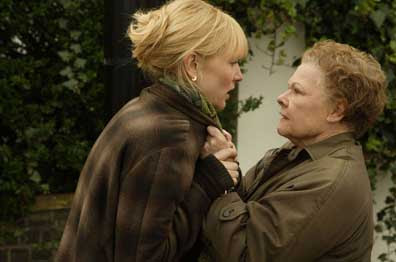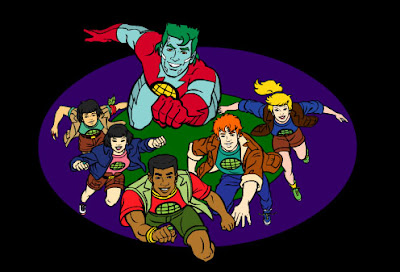
In 1990 Ted Turner started a cartoon series called Captain Planet in which 5 ethnically diverse kids had the unique powers of earth, wind, fire, water, and heart. These powers were represented and embodied in the rings they wore. These power were to be used to ward off ecologically harmful villains and conditions like smog, toxic waste, and animal poaching.
 Sometimes, eco-villians would be too powerful for the Planeteers to ward off by themselves and using their rings, they could enlist the power of the super-powerful Captain Planet, an almost unstoppable force with infinite powers and abilities which could ward off eco-danger.
Sometimes, eco-villians would be too powerful for the Planeteers to ward off by themselves and using their rings, they could enlist the power of the super-powerful Captain Planet, an almost unstoppable force with infinite powers and abilities which could ward off eco-danger.
I think sometimes we have an inept and independent view of God. It's as though in the American church we often get in to a mindset where we, aware of our God given talents and giftings try to do those most Christian things, and the hope is that with our powers combined we can illicit God through the work that is done through the divine-fully-functional, every-one-is-in-their-proper-place church. I think our view of God is limited that way...as if God can only do powerful things if every person is doing their part.
The Bible talks about how God/the Holy Spirit gives people different Spiritual Gifts, and compares the interconnecting of these gifts as though parts of a single body which God has created with different parts with different functions (eyes, ears, livers and kidneys).
In constructing the American Church, I think that at times we get into a view that God will only be manifested in the lives of people, the community, and the world if "the body" is properly organized and coordinated. This means eyes, livers, and toes need to be discovered within the "church body" and properly put to use in the church nursery, handing out communion, counting the offering, singing in the choir/worship group/rock band, and preaching the Sunday sermon. And when all people and pieces are in place, it is then that (I feel) many believe God will show up, save the day and be present for a whatever the desired purpose is (whether it ultimately is social, political, and/or spiritual impact that is sought).
I fear that God did not give people gifts so they could simply evoke his presence and power amongst each other. In fact I don't think God would, through Christ and his Spirit, give people gifts at all just to be used among each other, to draw forth an analogise embodiments of Christ.
No, instead I think God is not like Captain Planet at all. God is not the be called forth and drawn out. In fact, God is always there.
In so much as God has given us unique gifts in accordance with the grace given to us, it seems as though these gifts are given to be used in the most active of ways. It would seem a pity if a person had the gift of leadership, encouragement, or teaching and only used it in the confines of church.
Church is not the end all and be all of ministry. The purpose of Church is not to use our own gifts to beckon forth the full embodiment of God as though God were Captain Planet.
No, if Captain Planet was to be an analogy for the Christian faith (which clearly it is not, nor was it intended to), then when people have a life-transforming encounter with Captain Planet/God then he would entrust to them a gift/mission/purpose. To Abraham he was given Faith, which led him to go to follow God to go to a place where he would be the father of nation of Israel. Or after an encounter with God, the Samaritan woman at the well came to believe in the redeeming power of God and instantly told others about him and in a powerful way introduced others to him. The stories are endless, whether it's the apostles, Paul, the four friends who carry their friend to see Jesus, Nehemiah...it doesn't matter. Different people were given different gifts and roles in carrying out the message of God/Christ in a powerful way.
I believe that when we encounter God he gives us gifts to be used (although we may not be able to always neatly identify them) in whatever ways possible, so that he may receive Glory. After encountering God we are to be used by God.
I think that the body of Christ as represented and discussed in 1 Corinthians 12 and Romans 12 is less so for God to have power (because he's already omnipotent), but instead it is to help those who've encountered Christ to continue to encourage and minister to each others as we see in the end of Acts 2 as the early church is described. As I see it, the purpose of the early Church was not to be or be used to beckon forth God, or even to be as an institution responsible for spiritual work, but was a natural formation of those who were following Christ as a source of encouragement, fellowship, power, and focus to bless one another as they used their gifts among each other and in the world.
Related Tags: God, Captain Planet, Planeteers, Spiritual Gifts, The Church, church, Jesus, Christ, Bible, Ministry
Captain America is only one of the memorable cartoon faces of the 90's. If you're looking to find out more cartoon wikis make it easy. Can't find a wiki of your favorite cartoon? It's easy to create a free wiki on the subject of your choice.
 This post is about all the people in the movie Bobby, not playing Bobby.
This post is about all the people in the movie Bobby, not playing Bobby. He's touching, he's funny, and strangely natural in the role of Jose, a kitchen-staff employee who loves baseball and cares about Latino rights.
He's touching, he's funny, and strangely natural in the role of Jose, a kitchen-staff employee who loves baseball and cares about Latino rights. Demi, want don't you try picking up some stronger roles so you could score your first academy award nomination...you have talent. The execution of Viriginia Fallon is tons of fun.
Demi, want don't you try picking up some stronger roles so you could score your first academy award nomination...you have talent. The execution of Viriginia Fallon is tons of fun. 4. Harry Belafonte - And to think it's Demi Moore who sings in this movie. This was a touching inclusion in the film.
4. Harry Belafonte - And to think it's Demi Moore who sings in this movie. This was a touching inclusion in the film. if it was, she'd be number one...Amanda Bynes, you have nothing on Metkina!
if it was, she'd be number one...Amanda Bynes, you have nothing on Metkina!

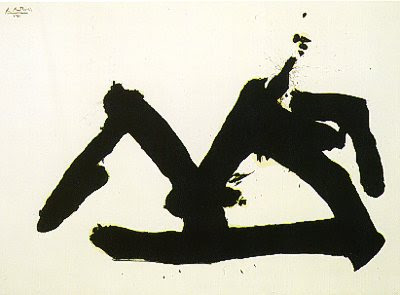
 Probably one of the most rewarding things I've ever watched has been all 7 episodes in Michael Apted's Up Series, which Kim and I finished watching last Sunday.
Probably one of the most rewarding things I've ever watched has been all 7 episodes in Michael Apted's Up Series, which Kim and I finished watching last Sunday.
 In 1990 Ted Turner started a cartoon series called Captain Planet in which 5 ethnically diverse kids had the unique powers of earth, wind, fire, water, and heart. These powers were represented and embodied in the rings they wore. These power were to be used to ward off ecologically harmful villains and conditions like smog, toxic waste, and animal poaching.
In 1990 Ted Turner started a cartoon series called Captain Planet in which 5 ethnically diverse kids had the unique powers of earth, wind, fire, water, and heart. These powers were represented and embodied in the rings they wore. These power were to be used to ward off ecologically harmful villains and conditions like smog, toxic waste, and animal poaching.
 Recently, I've been addressing the
Recently, I've been addressing the 



 Robin Williams breathe's unique life into some of hollywood's most bizarre and engaging characters. Some of his roles have been a little too much for me (like Toys, or Jakob the Liar).
Robin Williams breathe's unique life into some of hollywood's most bizarre and engaging characters. Some of his roles have been a little too much for me (like Toys, or Jakob the Liar). As I have become generally uninterested in the summer blockbusters, I have begun to increasingly look forward to fewer trilogies, and more original work in the fall.
As I have become generally uninterested in the summer blockbusters, I have begun to increasingly look forward to fewer trilogies, and more original work in the fall. The story looks like the
The story looks like the 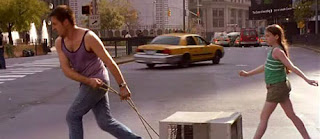



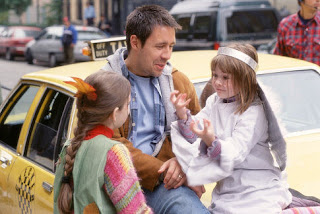





 The concept of information overload is pretty well known. This concept has inspired my thoughts on
The concept of information overload is pretty well known. This concept has inspired my thoughts on 





